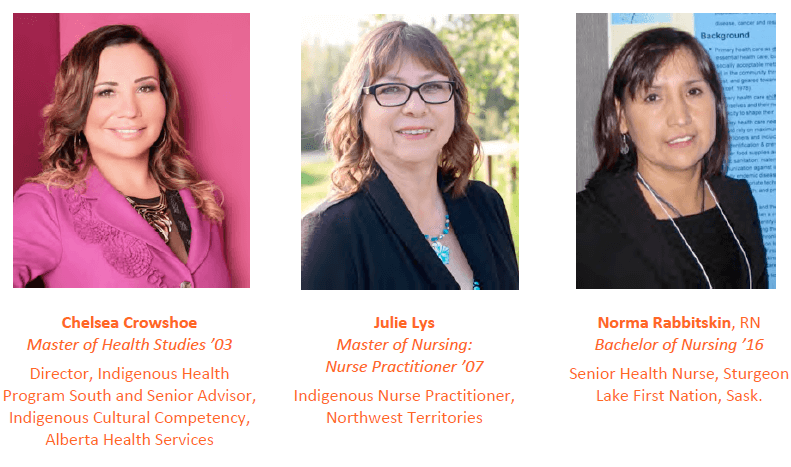Walking together towards conciliation
Honouring the perspectives of Indigenous peoples is essential for health-care education and practice to move forward. Three Indigenous alumni are helping to open avenues for conversation, enriching the Faculty of Health Disciplines’ conciliation journey.
Health-care providers and educators have a key role to play in responding to the Truth and Reconciliation Commission of Canada’s Calls to Action, and in promoting positive relationships among Indigenous people and the education and health-care systems.
The conciliation journey being taken by the Faculty of Health Disciplines (FHD) is shared among alumni, students, faculty, and staff. It is being guided by Nukskahtowin—formerly known as AU’s Centre for World Indigenous Knowledge & Research—and the FHD conciliation working group.
Three Indigenous alumni are integral to the working group, providing invaluable perspective and insight: Chelsea Crowshoe, Julie Lys, and Norma Rabbitskin.

“Chelsea, Julie, and Norma help us open the doors to different conversations and perspectives,” explains Rose Schroeder, Bachelor of Nursing program director and chair of the working group. “They do not speak for all Indigenous people, but, rather, they help us all listen.
“Because they are keenly aware of health care issues—from their personal lives and their professional practice—they provide a richer foundation for our discussions and make our process better.”
Those conversations will help open the doors to new knowledge and lead to changes in health-care education and practice in systems that are well established, rigid, and often resistant to change.
“When educating health-care professionals, it is important that they understand all perspectives,” Lys said, explaining that she has worked hard to break down silos by integrating Western and Indigenous perspectives into her own life and practice.
“Historically, the Indigenous perspective hasn’t been acknowledged in the way that it should be,” she said.
“Understanding the importance of culture, of spirituality, of looking at people’s life journey instead of simply seeing them as a patient or client, of seeing health from a position of strength and connection, can change practice and improve healing and wellness.”
Norma Rabbitskin agrees that the educational system does little to prepare students to work with First Nations peoples and communities.
“People are typically trained using the bio-disease model, focusing on the disease and not on the person,” she said. “Our people, however, do not focus on deficit thinking. We have a more strength-based and holistic world view.”
FHD’s conciliation working group, she believes, is opening a doorway to learn how culture plays important role in the health and well-being of First Nations peoples.
“I speak from many areas of lived experience,” Rabbitskin said. “I hope that by telling my story, and talking about our wellness model, our systems, our Indigenous world views and our ways of knowing, that people can learn.
“Other universities need to open doorways of opportunities like this, and to invite Indigenous knowledge keepers to be part of change.”